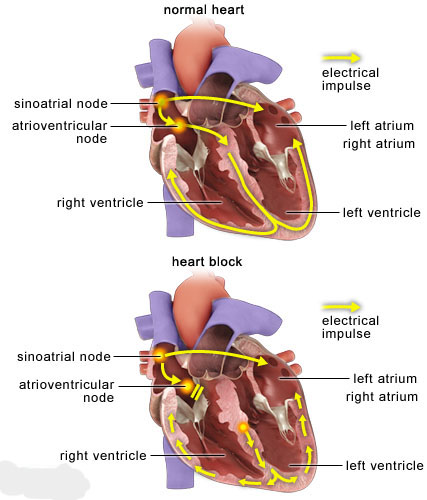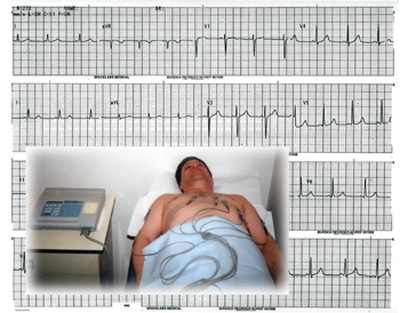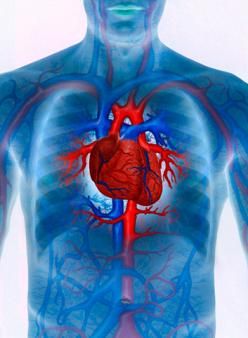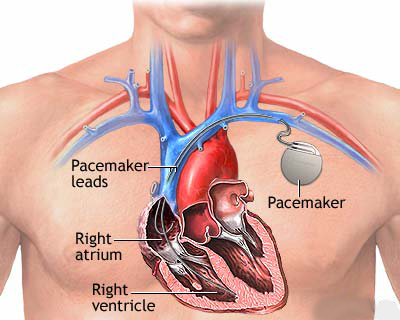What is Heart Block?
A heart block is a disease in the electrical system of the heart. This system controls the rate and rhythm of heartbeats. ("Rate" refers to the number of times your heart beats in a minute.)This is opposed to coronary artery disease, which is disease of the blood vessels of the heart. While coronary artery disease can cause angina (chest pain) or myocardial infarction (heart attack), heart block can cause lightheadedness, syncope (fainting), and palpitations.With each heartbeat, an electrical signal spreads across the heart from the upper to the lower chambers. As it travels, the signal causes the heart to contract and pump blood. This process repeats with each new heartbeat.Heart block occurs when the electrical signal is slowed or disrupted as it moves through the heart.
Overview
Heart block is a type of arrhythmia. An arrhythmia is any problem with the rate or rhythm of the heart.You can be born with heart block or you can develop it. If you're born with it, it's called congenital heart block. If it develops after birth, it's called acquired heart block.Acquired heart block is more common. Damage to the heart muscle or to the heart's electrical system causes acquired heart block. Diseases, surgery, or medicines can cause this damage.Congenital heart block may be found before or after a baby is born. If certain diseases occur during pregnancy, they may cause a baby to be born with heart block. Some congenital heart defects also may cause congenital heart block. Often, doctors don't know what causes these defects.The three types of heart block are: first degree, second degree, and third degree. First degree is the least severe and third degree is the most severe. This is true for both congenital and acquired heart block.Doctors use a test called an EKG (electrocardiogram) to help diagnose heart block. This test detects and records the heart's electrical activity. It records the data on a graph so the doctor can review it.
Symptoms of heart block
Most of the time, however, it is caused by anunderlying condition that damages the heart muscle and its ability to conduct electricalimpulses.Underlying causes of flutter include dysfunction of the sinus node (the "natural pacemaker" ofthe heart) and a number of heart and lung disorders, including coronary artery disease,rheumatic heart disease, mitral valve disorders, pericarditis, and others.Hyperthyroidism, hypertension, and other diseases can cause arrhythmias, as can recentheavy alcohol use (binge drinking). Some cases of atrial flutter occur in the setting of a heartattack or soon after surgery on the heart.

How it's diagnosed
Heart block may be diagnosed as part of a routine doctor's visit or during an emergency situation (third-degree heart block is an emergency).Your doctor will diagnose heart block based on your family and medical histories, a physical exam, and results from tests.
Specialists involved
Your primary care doctor may be involved in diagnosing heart block. However, if you have the condition, you may need to see a heart specialist. Heart specialists include:
• Cardiologists (doctors who treat adults with heart problems)
• Pediatric cardiologists (doctors who treat babies and youths with heart problems)
• Electrophysiologists (doctors who specialize in the heart's electrical system)
What to expect
When inquiring about family and medical histories, your doctor may ask whether:
• You have any signs or symptoms of heart block
• You have any health problems, such as heart disease
• Any of your family members have been diagnosed with heart block or other health problems
• You're taking any medicines, including herbal remedies and prescription and over-the-counter medicines
• You smoke or use alcohol and drugs
Your doctor also may ask about other health habits, such as how much physical activity you do. During the physical exam, your doctor will listen to your heart's rhythm. He or she will listen carefully for abnormal rhythms or heart murmurs (extra or unusual sounds heard during heartbeats). Your doctor may also:
• Check your pulse to find out how fast your heart is beating
• Check for swelling in your legs or feet, which could be a sign of an enlarged heart or heart failure
• Look for signs of other diseases that could be causing a problem with the heart's rate or rhythm (such as coronary artery disease)
Diagnosis test and procedures
EKG Test

Doctors usually use a test called an EKG (electrocardiogram) to help diagnose heart block. This simple test detects and records the heart’s electrical activity. It shows how fast the heart is beating and its rhythm (steady or irregular). An EKG also records the strength and timing of electrical signals as they pass through each part of the heart.
The data is recorded on a graph. Different types of heart block have different patterns on the graph. A standard EKG test only records the heart's activity for a few seconds.
Holter and Event Monitors
To diagnose first- or second-degree heart block, your doctor may have you wear a Holter or event monitor.Holter and event monitors are similar to EKGs, but they're portable devices. You can wear a Holter or event monitor while you do your normal daily activities. This allows the device to record your heart's electrical activity for a longer time than an EKG.
Electrophysiology Study
For some cases of heart block, doctors may do electrophysiology studies (EPS). During an EPS, a thin, flexible wire is passed through a vein in your groin (upper thigh) or arm to your heart. The wire records your heart's electrical signals.

How is heart block treated
Treatment depends on the type of heart block you have. First-degree heart block usually needs no treatment.If you have second-degree heart block, you may need a pacemaker.
A pacemaker is a small device that's placed under the skin of your chest or abdomen. This device uses electrical pulses to stimulate the heart to beat at a normal rate.
If you have third-degree heart block, you will need a pacemaker. In an emergency, a temporary pacemaker may be used until you can get a permanent one. Most people who have third-degree heart block need pacemakers for the rest of their lives.
Some people with third-degree congenital heart block don't need a pacemaker for many years. Others may need a pacemaker at a young age or during infancy.In some cases, acquired heart block may go away if the factor causing it is treated or resolved. For example, heart block that occurs after a heart attack or surgery may go away.
Also, if a medicine is causing heart block, the condition may go away if the medicine is stopped or the dosage is lowered. However, you shouldn't change the way you take your medicines unless your doctor tells you to.
Living with heart block
First-degree heart block may not cause any symptoms or require treatment. If you've been diagnosed with this condition, ask your doctor whether you need to take any special measures to control it. Your doctor can tell you whether you need ongoing care or whether you need to change the way you take certain medicines.
If you have second-degree heart block that doesn't require a pacemaker, talk to your doctor about keeping your heart healthy. Your doctor will tell you whether you need ongoing care for your condition.

Living with a pacemaker
People who have third-degree heart block and some people who have second-degree heart block need pacemakers. If you have a pacemaker, you should take special care to avoid things that may interfere with it.Avoid close or prolonged contact with electrical devices and devices that have strong magnetic fields. These objects can keep your pacemaker from working properly.
Let all of your doctors, dentists, and medical technicians know that you have a pacemaker. You also should notify airport screeners.
Certain medical procedures can disrupt pacemakers. These include MRI (magnetic resonance imaging), electrocauterization during surgery, and shock-wave lithotripsy to get rid of kidney stones.Your doctor may need to check your pacemaker several times a year to make sure it's working properly. Some pacemakers must be checked in the doctor's office, but others can be checked over the phone.
Ask your doctor about what types of physical activity are safe for you. A pacemaker usually won't limit you from doing sports and physical activity. But you may need to avoid full-contact sports, such as football, that can damage the pacemaker.
Acknowledgements
Heart Rhythm Specialists of South Florida gives special thanks to the National Library of Medicine and National Heart Lung and Blood Institute whose Web sites aided in the research of the patient educational material provided above.






